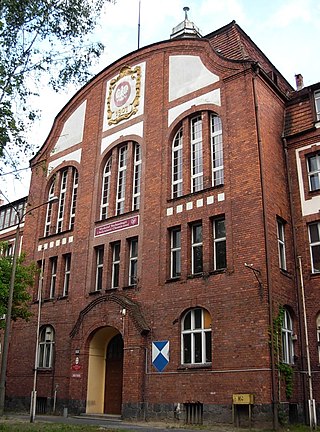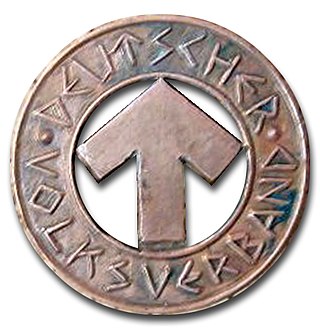
Ciechanów is a city in north-central Poland. From 1975 to 1998, it was the capital of the Ciechanów Voivodeship. Since 1999, it has been situated in the Masovian Voivodeship. As of December 2021, it has a population of 43,495.

Warsaw is one of the most important education centres of Poland. It is home to four major universities and over 62 smaller schools of higher education. The overall number of students of all grades of education in Warsaw is almost 500,000. The number of university students is over 255,000.

SGH Warsaw School of Economics is the oldest and most prestigious business school in Poland.

The Warsaw Stock Exchange (WSE) is a stock exchange in Warsaw, Poland. Founded in 1817, it was located in the Saxon Palace until 1877 when it was moved to the Exchange Building at the Saxon Garden. Currently, it is located at ul. Książęca 4 in the Śródmieście District of Warsaw in the Exchange Center Building opened in 2000. As of September 2024, there are 410 companies, including 42 foreign ones, quoted on the stock exchange whose market capitalization amounts to PLN 1.50 trillion, making it the largest stock exchange in Central and Eastern Europe. The most important stock market indices of the Warsaw Stock Exchange are WIG20, WIG30, MWIG40 and SWIG80. Trading at Warsaw runs from 08:30 to 17:00 with closing auction from 17:00-17:05.

The 9th Infantry Division was a unit of the Polish Army in the Second Polish Republic. For most of 1919, the 9th Division's regiments were dispersed across the regions of Podlachia, Polesie and Volhynia, with one battalion sent to Dąbrowa Basin.

Vistula University is a non-public university based in Warsaw, Poland. It was established in 1991 as the University of Insurance and Banking. In January 1992, it was entered in the register of non-public higher education institutions of the Ministry of National Education and Sport under number 2. It achieved its current status through dynamic development and merger with other non-public higher education institutions. Currently, Vitula University together with the Vistula School of Hospitality form the main pillars of the Vistula Group of Universities. In 2019, Aleksander Gieysztor Academy of Humanities in Pułtusk became one of its branches. In the Perspektywy 2024 ranking, it is ranked 4th among the best non-public universities in Poland. Vistula University students come from over 100 countries.

Grzegorz Marek Michalski is an economist, researcher at the School of Management, Computer Science and Finance at Wrocław University of Economics. His main area of research are Business Finance and Financial Liquidity Management. Grzegorz Marek Michalski is a professor of finance. Much of his research is aimed at understanding the determinants and dynamics of financial corporate liquidity. In his research, he has examined the firm value and cost of capital results of corporate liquidity management policies and results of demand for liquidity by firms. He has also investigated the effects of corporate liquidity on portfolio choice and corporate current assets decisions. Currently, Grzegorz Marek Michalski is studying the liquidity decisions made by nonprofit organizations. Grzegorz Marek Michalski also studies current business investment in accounts payable, inventories and operating cash. Recent grants and projects examine the effect of liquidity constraints on nonprofit organizations and for-profit small enterprises decisions to level of current assets investments, and on whether or not to use such information on cost of capital level and results on business valuation results. In ongoing work, he studies the unique risk characteristics of business organization capital, and documents the high expected returns which enterprises heavily invested in organization capital earn. Grzegorz Marek Michalski work has been published in ISI academic journals such as the Romanian Journal of Economic Forecasting, the Journal of Economic Computation and Economic Cybernetics Studies and Research, and the Agricultural Economics - Zemědělská ekonomika.

Bydgoszcz University of Science and Technology is a state-run institution of higher education in Bydgoszcz, Poland. According to international ranking by the Webometrics Ranking of World Universities published by the Spanish institute Consejo Superior de Investigaciones Científicas the University takes 23rd place among the technical universities within the country and, on the world scale, number 1,769 within all listed universities.

Deutscher Volksverband in Polen (DVV), or the German People's Union in Poland, was a Nazi German extreme right-wing political party founded in 1924 in central Poland by members of the ethnic German minority who did not wish to join the minority bloc in the Polish parliament Sejm. DVV was headed by August Utta, and financially supported by the Reich Ministry of Finance. Deutscher Volksverband was most active in the Łódź and Tomaszów area.

Janusz C. Szajna - Polish entrepreneur, scientist and university professor. He contributes to the field of computer science, including advising the 'Commission for Digitization, Innovation and Modern Technologies' of the Polish government.
WSB Merito Universities are group of state-recognized private (non-public) universities in Poland. WSB Universities are the largest group of business schools in Poland and have been conducting educational activities in ten Polish cities. In 2013 – 82% and in 2014, 85% of students of WSB Universities were studying and at the same time working, gaining work experience and professional competence.
Konrad Talmont-Kamiński is an analytic philosopher and cognitive scientist, dealing with epistemology, philosophy of science, philosophy of mind and the theory of rationality. His work is also influenced by psychology, biology, history, anthropology and other disciplines.

Łukasz Sułkowski is a Polish professor of economic sciences, specializing in management sciences. Currently employed in the Institute of Public Affairs of the Jagiellonian University, vice-president for international affairs of the Polish Accreditation Committee and Director of Clark University Branch Campus at University of Social Sciences in Poland. He is also the President of PCG Polska.
Jolanta Maria Żyndul is a Polish historian, a specialist on modern Jewish history and Polish-Jewish relations in 19th and 20th century.

Włodzimierz Krzysztof Sroka was a Polish economist and manager, associate professor of strategic management at the WSB University in Dąbrowa Górnicza.

Helena Krasowska is a Polish linguist and professor at the Institute of Slavic Studies of the Polish Academy of Sciences in Warsawand visiting professor at the Center for Eastern Europe at the University of Warsaw.

Kaczyzm is a Polish neologism and an ideological concept literally describing the rule of the Law and Justice party (PiS), derived from the names of Polish politicians, brothers Jarosław and Lech Kaczyński. As an ironic or propaganda term, it is used by opponents of the political groups of the Kaczyński brothers, while considered inaccurate and offensive by PiS supporters. Although in recent years the phrase has been reappropriated by supporters of Law and Justice and is sometimes compared to Trumpism in the United States.

University of Applied Sciences in Nowy Targ (Polish: Akademia Nauk Stosowanych w Nowym Targu(ANS)) is a public vocational university in Nowy Targ, Poland. Over 90% of students at ANS come from Podhale, Spiš and Orava.
Ewa Joanna Bulska is a Polish chemist, and Professor of Chemical Sciences at the University of Warsaw, who specializes in analytical chemistry, atomic and mass spectrometry with over 237 scholarly publications.

FERRUM SA is an ironworks established in 1874, located in Katowice at 11 Porcelanowa Street, in the Zawodzie district in Poland. The key producer of large diameter steel pipes in Poland. The company's products are used, among others, in petrochemical industry, heating, water and sewage networks, in hydrotechnics, energy and construction. It is listed on the Warsaw Stock Exchange.
















